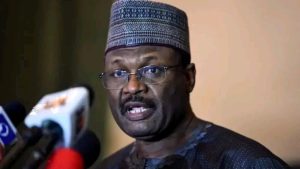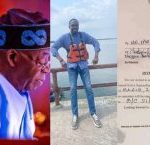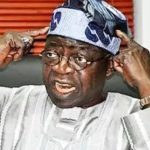
Professor Mahmood Yakubu, the National Chairman of Nigeria’s Independent National Electoral Commission (INEC), is being replaced with a yes-man in an attempt to sabotage the 2027 general election. In November of this year, Yakubu will have completed two terms in office.CONTINUE FULL READING>>>>>
According to investigations, President Bola Ahmed Tinubu had not yet completely embraced the plot’s premise. However, the president’s known friends are the ones pulling the strings from outside the Aso Rock Presidential Villa. A 1999 graduate and former South-South governor is spearheading this movement. It occurs at a time when the general elections in 2023 and subsequent off-season elections have severely damaged the Election Management Body’s reputation.
The nomination and approval of a flexible person as Yakubu’s successor is one strategy being considered in order to make the narrative work. According to Vanguard, some names are already being proposed for potential consideration. Regretfully, the plotters’ designated individuals had previously held positions as Resident Electoral Commissioners (RECs) and National Commissioners of the Commission, neither of whom wore a uniform.
The amount of their malleability actually appears to have been a reasonable factor in their decision, as it would undermine INEC’s reputation in holding free, fair, and credible elections. Nigerians look back on the general elections of 2003 and 2007 with nostalgia, and the late President Umar Musa Yar’Adua, a beneficiary of the 2007 fake presidential election, publicly acknowledged that the election that put him in power had problems.
Any elected or appointed state official, such as the president, must have authority derived from the Constitution in a democracy with a written Constitution; otherwise, it is void, in contrast to the British parliamentary system where the Constitution is unwritten. “This Constitution is supreme, and its provisions shall have binding force on all authorities and persons, including the President, throughout the Federal Republic of Nigeria,” states Section 1 of the 1999 Constitution (as amended) unequivocally.
Only Sections 154(1) and (2) of the Constitution specify how the Chairman and members are to be appointed. The Constitution stipulates that “the president shall consult the Council of State” before using his authority to choose the Chairman or members of INEC, and that the Senate must confirm the nomination. According to the Third Schedule, Paragraph 14 of the Constitution, INEC was created as a truly independent organization, and its members “shall be persons of unquestionable integrity” and “shall not be members of a political party.”
The ruling All Progressives Congress (APC) party recently named card-carrying members as INEC Commissioners. Regretfully, the APC was not the first to adopt this technique. President Muhammadu Buhari, who was riding high on the energy and resolve of Nigerians to embrace change, threw INEC into a whirlpool of unnecessary controversy on Tuesday, June 30, 2015, when he failed to appoint a substantive national chairman for INEC until the term of the largely reformative Professor Attahiru Jega ended. This was an extremely odd but oddly inexplicable event.
Jega gave Ambassador (Dr.) Ahmed Wali authority to lead and oversee the commission’s operations until a substantive chairman is chosen “in consultation with the Council of State,” as stipulated by the constitution, in accordance with the law and seniority order. But within 24 hours, Buhari—who had only been sworn in 36 hours earlier—overruled Jega and named Mrs. Amina Bala Zakari, a family member, as INEC’s acting head.
In a letter, Barr. Danladi Kifasi, the then-head of the Federation’s civil service, announced the appointment, stating that it would take effect on June 30, 2015, and continue until a substantive chairman was appointed. Zakari and Wali were both INEC National Commissioners at the time. However, Wali was superior than Zakari in terms of seniority.
It’s interesting to note that Buhari, who was proclaimed the victor of the March 2015 presidential election and should have received a briefing from his transition team regarding the appointments he needed to make as soon as he took office, either didn’t know what was going on in INEC or had already decided to name a family member as INEC chairman. It required multiple investigative articles by Vanguard and resistance from national patriotic activists to prevent Buhari from nominating his “sister” as INEC chairman, as the commotion caused by his mistake at the time placed INEC under the bus.
After much lobbying and counter-lobbying to find a “suitable replacement” for Jega, Buhari finally named Professor Mahmood Yakubu as the substantive head of INEC on Wednesday, October 21, 2015, about four months later. The two contentious general elections in 2019 and 2023 were run by that “suitable replacement.” While the former was embroiled in a dispute over having a server in INEC, the latter suffered irreparable harm when its highly praised BVAS and IReV platforms were rendered inoperable.
President Tinubu has five distinct months to find and name a suitable Jega-style successor, just as was done in Ghana when Kwadwo Afari-Gyan’s term came to an end and Madam Jean Mensa was chosen to carry on the wonderful work Afari-Gyan had begun. The newspaper was reliably informed by Aso Rock insiders that President Tinubu recognized the value of reliable polling.
“His declaration that NYSC members should be used to support the conduct of the coming census is not just about saving cost alone but about ensuring credibility of the process,” a source close to the president said. He views the selection of Professor Yakubu’s successor in the same manner. He wants to help guarantee that Nigerians’ faith in INEC is maintained and that the process is credible. President Goodluck Ebele Jonathan’s record of holding credible, free, and fair general elections in 2015 is what Nigerians remember about him. He is therefore well-known throughout the world as a reliable election observer.
Prior to Jonathan, General Abdulsalami Abubakar, the former head of state, had a solid worldwide reputation after he transferred power to a civilian government and finished a transition program that included a legitimate election process in 1999. Mathew Okikiolakan Aremu Olusegun Obasanjo, a former military and civilian president who was born in Owu, is still praised internationally for his 1979 transition program, which gave rise to the Second Republic.
African heads of state were transitioning into civilian presidents during this time. These demonstrate the widespread acceptance of the importance of legitimate elections and the importance of the integrity of the leader overseeing them, or vice versa. Nigeria’s electoral laws are among the best in Africa, but they demand honest operators.
Nigeria has adopted the same norms and standards as many other African nations that are signatories to the AU Charter on Democracy and Good Governance, the New Partnership for Africa’s Development, the NEPAD, and peer review democratic processes. Nigeria has even gone so far as to expand their applicability in the Nigerian context by introducing innovative procedures like biometric electronic voter registration, electronic transmission of election results from polling stations, and a number of other electoral rule amendments that have been approved by political actors based on recommendations from experience to enhance the electoral process’s integrity.
However, operators frequently make mistakes or are under pressure to make mistakes while putting the framework’s rules and regulations into practice, even if these innovations are frequently well ahead of other electoral legal frameworks in Africa. In contrast to the Adamawa scenario, the Akwa-Ibom and Abia cases illustrated the significant influence of human agency.
These opposing situations, as well as the tenacious manner in which REC Mike Igini pursued the prosecution of two university professors for electoral offenses in Akwa Ibom and the actions of Professor Nnenna Oti in Abia, who refused to be intimidated into declaring a fraudulent outcome, are striking contrasts to Adamawa REC’s decision to announce a phony governorship election result in violation of electoral regulations. Similarly, dismissing Chidi Nwafor as Director of ICT had a severe effect on the general elections in 2023, especially the humiliating failure of the IREV, whose inviolability Professor Yakubu had bragged about.
Subsequently, Professor Okechukwu Ibeanu, a National Commissioner in charge of Operations, was not reappointed, which is a disgrace because it failed to recognize and promote appointees who have shown a strong sense of integrity and prevented the Anambra elections from being manipulated, including by internal sabotage. There are still some members of the electoral operators’ team who worked with the late Professors Eme Awa and Humphrey Nwosus. Despite their senior age, the Tinubu government would benefit greatly from the institutional memory of Professors Adele Jinadu, a former National Commissioner, and Tonnie Iredia, the NEC Director of Public Affairs.
Beyond combating election fraud and malpractice, the Nigerian political process needs a comprehensive overhaul that prioritizes selecting and keeping candidates with a track record of integrity and hard work. Election competition will be de-escalated with the help of seasoned and reliable personnel, and the process may become easier to handle in terms of processes, including reducing the impact of political actors on the creation and approval of election legislation.
As a leader who gained power via opposition to election annulment, Tinubu should support these measures as well as a number of others that the public has suggested and universally regarded as essential to election integrity. Gaining public support for such a rebirth and selecting reputable election managers to guide such revisions to the EMB will be important steps in achieving increased legitimacy.
Working with a few reliable National Commissioners and RECs, former INEC Chairman Professor Attahiru Jega, who opposed the commission, made sure the 2015 general elections were credible. Oddly, some of the people Jega spoke to during the 2015 election were progressively removed from the system. Even more intriguingly, investigations have shown that the Buhari government purposefully stopped re-appointing some of the most combative supporters of the rule of law and INEC’s electoral standards.
This is the reason why the 2019 general elections were marred by disputes over the INEC Server, which was approved, funded, and purchased before abruptly disappearing. This was even after the national chairman publicly boasted that the election results for that year would be stored on a server.
The number of Nigerians who cast ballots in each general election cycle has been declining, with the exception of 2003, when 39 million were reported to have cast ballots, or 69.1% of the total population (See box). 29.8 million people reportedly cast ballots in 1999 (52.3%), 35.4 million in 2007 (57.5%), and the election was deemed a rape based on free, fair, and credible polls; 38.2 million in 2011 (53.7%), 28.6 million in 2015 (43.7%), 27.3 million in 2019 (34.8%), and 24 million in 2023 (26.7%).
A number of factors are to blame, including voter apathy brought on by mistrust of INEC and the ongoing difficulties voters encounter on election day, logistical problems that don’t seem to be getting better, violence on election day that turns off voters, and voters’ mounting dissatisfaction that their votes don’t count. In 2027, the issue might worsen because, despite Professor Yakubu’s assurances and promises regarding the inviolability of BVAS and IReV, which inspired millions of Nigerians to participate in the election, their hopes were crushed when it was revealed that some results had not been uploaded.
This can be prevented by strengthening pre-election issues, implementing post-election dispute resolution reforms, and strengthening BVAS and result transmission. President Tinubu might be leaving a legacy of integrity and probity if he can see to it that some of these suggestions—as well as a few others—are implemented.CONTINUE FULL READING>>>>>


